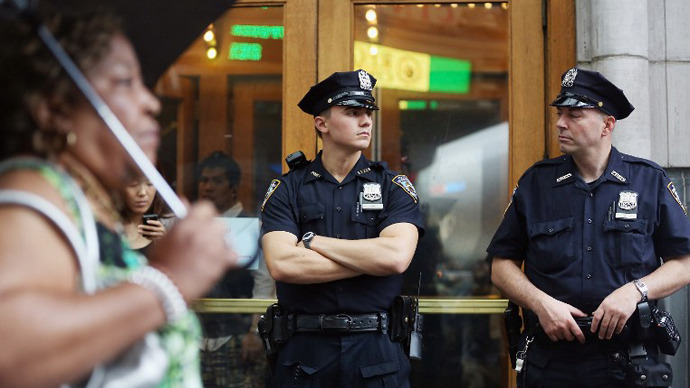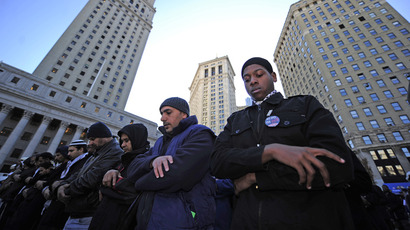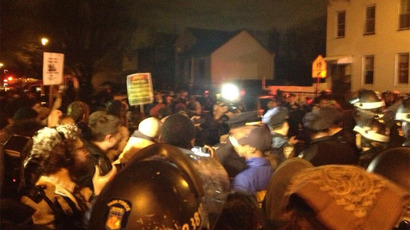Second NYPD officer testifies on stop-and-frisk quotas, racial targeting

Following a leaked recording seeming to prove the existence of an NYPD arrest quota system, a second police officer has come forward to explain to a federal judge why he decided to record his superiors as they directed him to increase “stop-and-frisks.”
Officer Pedro Serrano, an 8-year veteran of the New York Police Department, held back tears as he explained to the judge why he came forward: “It’s very simple. I have children. I try to be a decent person.”
Serrano joins another whistleblower from the Bronx, Officer
Adhyl Polanco, who testified earlier this week regarding his own
recordings as part of a federal class action suit against the City
of New York seeking to address racial disparities in the
department’s street stops.
Meanwhile, a 2003 settlement from a similar lawsuit set in place a requirement for the NYPD to track the stops. The resulting records showed that some 87 per cent of the 5 million individuals detained by police were black or Latino.
Officer Serrano presented a recording from June 2010 in which a female lieutenant told officers she was “looking for five” - that is, requesting a specific quota for criminal summonses from officers in the precinct. Serrano recorded another instance only a month later, in which another lieutenant made a similar reference to a “five-five-five,” indicating a quota in place for arrests, patrols and summonses at public housing projects.
Serrano testified that his performance evaluation subsequently dropped in every category, evidently for failing to meet the quotas. During a meeting with his supervisor, Serrano was told that his performance score was based more on his “numbers” and his “low activity.” At the time, his precinct’s captain is said to have informed him that the NYPD’s Operations Order No. 52 allowed her to implement “performance goals,” likely a veiled reference to quotas.
Much of Serrano’s testimony supports accusations that officers who refused or failed to meet quotas were subjected to discriminatory treatment. Serrano points to the fact that he was transferred to an undesirable post, denied a day off following a car accident near his home, and the vandalization of his personal locker - which included the placement of “rat stickers.”
In its denial of the quota system and a racial profiling policy, the NYPD claims that the appearances of both stem from departmental reliance on the CompStat program, that being the heavy policing of high-crime neighborhoods - which are often predominantly minority communities.
Still, Serrano’s testimony did reveal direct evidence of racial targeting at least in his precinct. In one specific recording, a lieutenant urged officers to concentrate on a region in the south Bronx: "St. Mary's Park: go crazy in there. Go crazy in there. I don't care if everybody writes everything in there. That's not a problem."
Officer Serrano also provided recordings of an appeals meeting with Deputy Inspector Christopher McCormick, regarding his low numbers for writeups - which he was told would only have been “appropriate for Central Park.”
The same meeting became heated after McCormick indicated Serrano’s numbers demonstrated a lack of initiative, an issue he demanded be rectified by detaining “the right people at the right time.” “And who are the right people?” asks Serrano, to which McCormick replies “I don’t have any trouble telling you this: male blacks 14 to 20, 21.”
Serrano’s testimony was presented as part of Floyd v. City of
New York, in which four plaintiffs claim they were racially
profiled by the NYPD. Four police officers presented evidence for
the prosecution.














